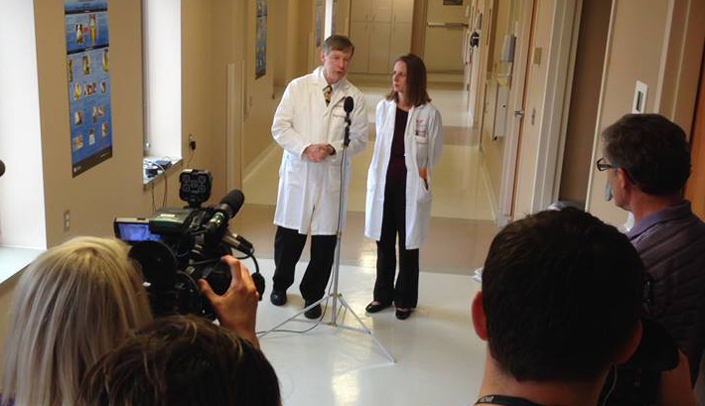A representative from the U.S. State Department visited the med center Friday to take a closer look at the capabilities of the Nebraska Biocontainment Patient Care Unit located at the UNMC/The Nebraska Medical Center campus.
This was strictly a fact-finding mission, to make government officials aware of the unit’s capabilities in case the need arises for treatment of patients with the Ebola virus here in the U.S.
Biocontainment Unit
The Biocontainment Unit was designed to provide a full spectrum of care, from quarantine to intensive care treatment. It is designed to handle everything from smallpox, SARS and avian influenza to the Ebola virus. It is staffed by 30 highly trained medical professionals who have special training in disaster management, cardiac life support and bioterrorism.
“We are uniquely qualified to care for these types of patients,” said Philip Smith, M.D., medical director of the unit and professor of internal medicine-infectious diseases at UNMC. “The unit has been operational for nearly 10 years, and our medical staff has been drilling for countless hours for this type of event. At this point, the most severe threat has been in west Africa, but we’re prepared to care for American citizens if necessary.”
The Biocontainment Unit is only one of four such units in the country equipped to handle an outbreak of this nature. The others are at Emory University in Atlanta, which already is receiving two American citizens who have contracted Ebola, the National Institutes of Health and the Rocky Mountain Laboratories in Missoula, Mont.
“We want to make it very clear that we haven’t been notified of any patients who are headed to Nebraska for treatment,” said Angela Hewlett, M.D., associate medical director of the unit and an assistant professor at UNMC. “This representative was only here to learn more about our unit and to determine if it meets the qualifications necessary for Ebola patients in the future. We’re honored that national health leaders have expressed confidence in our ability to help address this global health crisis. This is a clear indication that the med center is an international resource in health care, research and education.”
Audio
If a patient were to be treated in the unit, there would be no danger to others on campus or anyone else in the area.
Dr. Smith said the Ebola virus is very difficult to contract. It can only be spread by coming in contact with an infected person’s bodily fluids. It is not an airborne virus.
“The risk it would pose to people outside the unit would be zero, and this is something that can be very safely treated without infecting health care workers,” he said.
